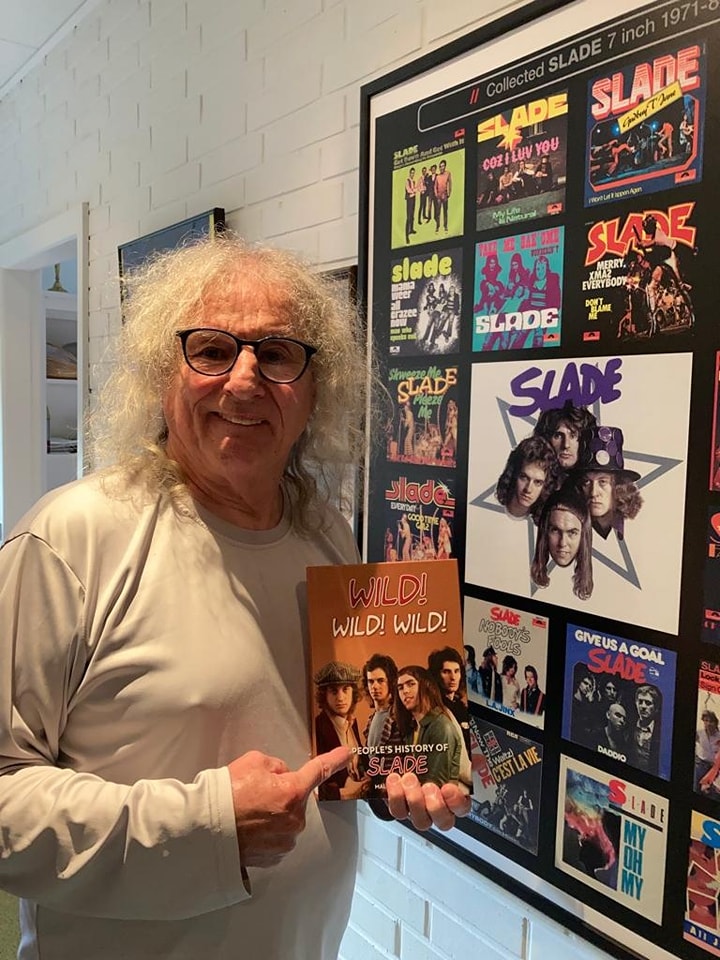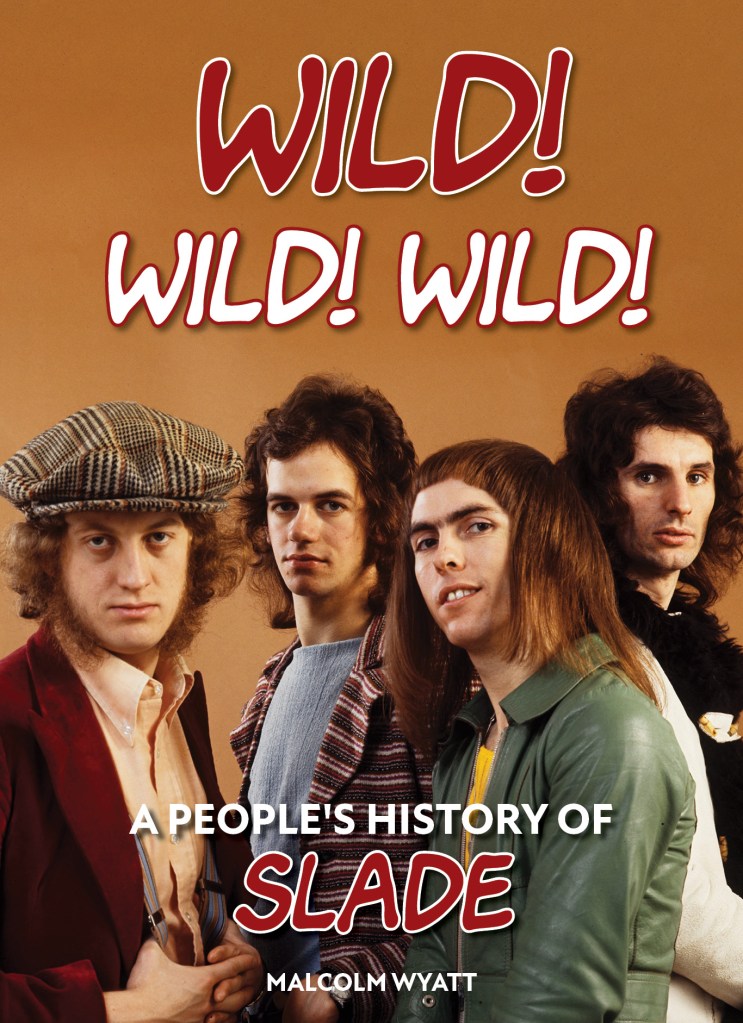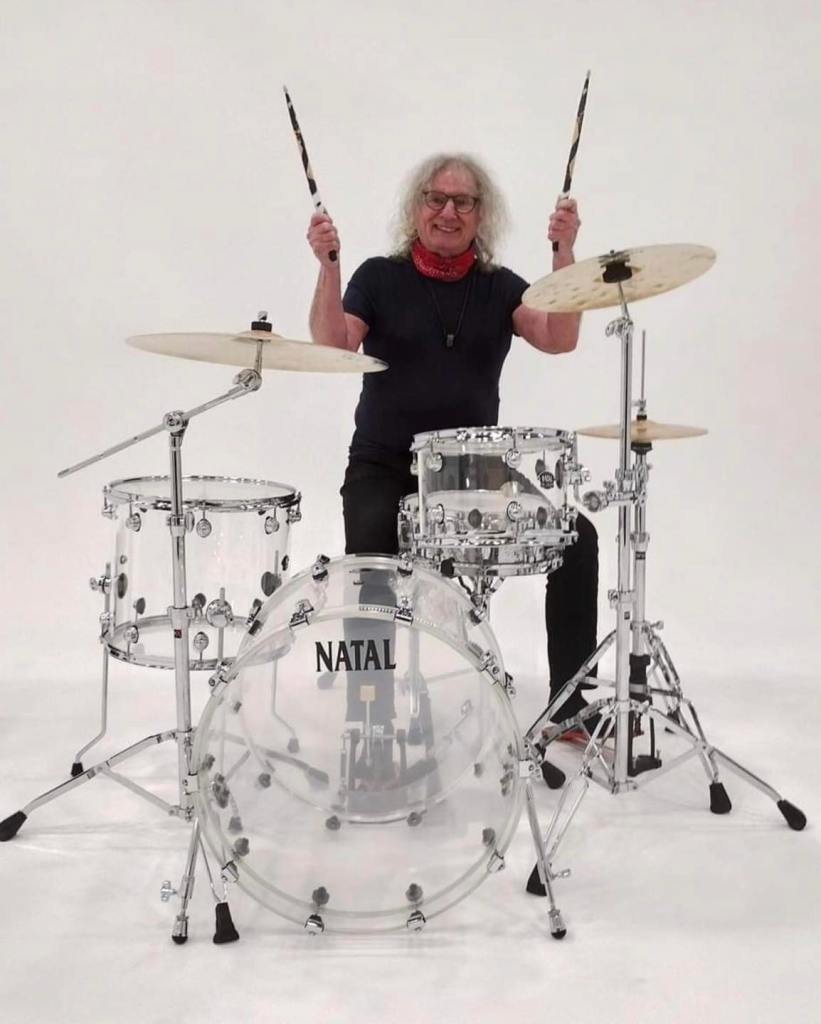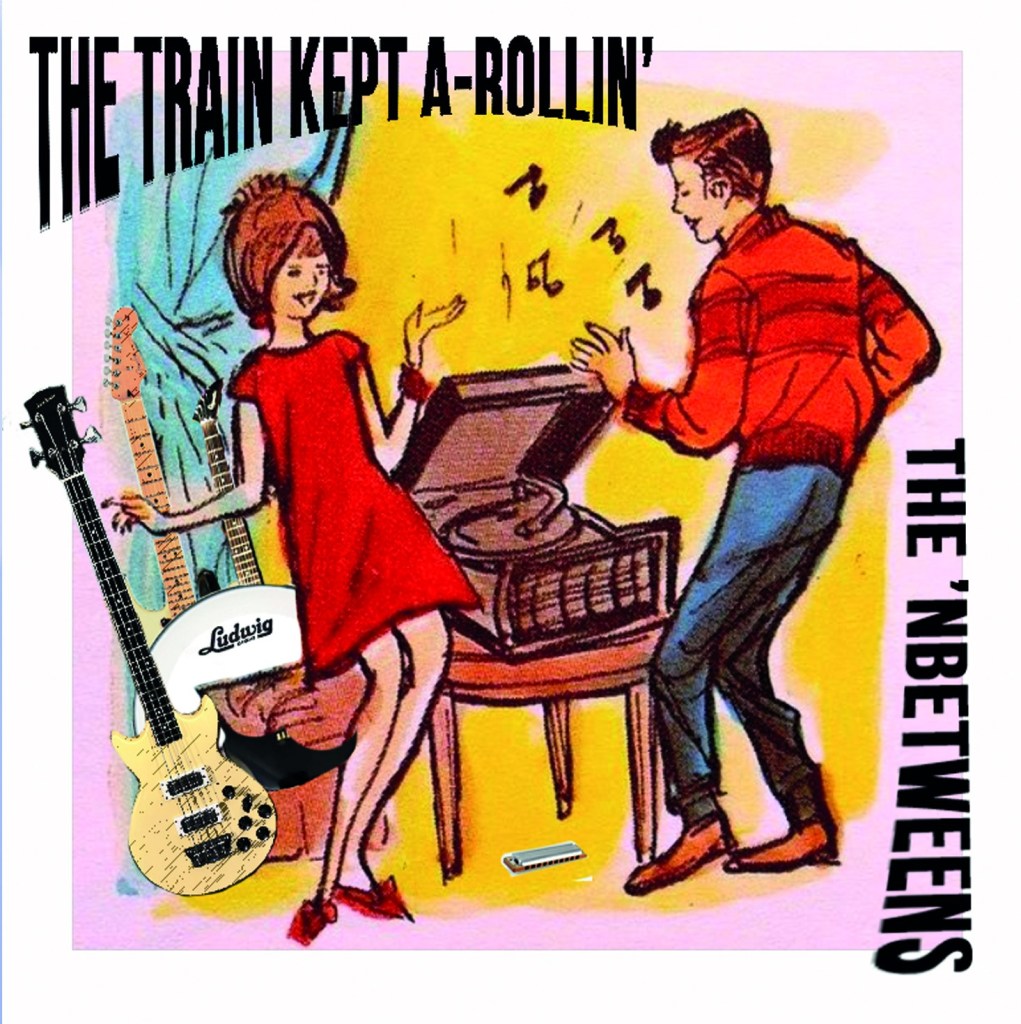
If you follow my social media, you’ll know I’ve become a little distracted across 2023, not least through completing Wild! Wild! Wild! A People’s History of Slade (available direct from the publisher via this link). And while this may sound a bit ‘arse about face’ – seeing as it only recently struck me that I haven’t written about that on this website since my request for people to share Slade-related memories, sightings and appreciations of the Black Country’s finest – today’s 77th birthday for Bilston-born drumming legend Don Powell is as good an excuse as any to give you a taster here, sharing part of the afterword.
It was in late May this year that Don took time out from a bank holiday weekend with his family in Silkeborg, Denmark, to talk to me. Don being Don, he was more than happy to help out, as was the case with previous conversations that led to feature/interviews here in December 2017, December 2020, and December 2022. And we started our Zoom call with me revealing how for several weeks I’d been back in a Slade zone, surrounded by their CDs, DVDs, vinyl, online resources, and past publications.
“Is that good or bad?” asked my interviewee, a mischievous grin on his face, but – as ever – genuinely questioning me, never one to assume public interest remained out there for his former band, despite all the evidence pointing to an enduring love for all things Slade. So I told him it was a very good thing, letting on that I’d been inundated with fans’ memories, memorabilia, photographs and tributes.
He’d not long since released his Don and the Dreamers LP, backed by a Danish band, that followed by The ‘N Betweens’ cracking comeback single, ‘The Train Kept a-Rollin”, when he joined forces with the one and only Jim Lea and fellow ’60s bandmates John Howells and Mick Marson.
“Yeah, and BMG have done a great package on all the old catalogue.”
It was also great to get not only Sweet legend Andy Scott but also the pair’s QSP bandmate Suzi Quatro involved with the book, I pointed out, each supplying cracking forewords.
“Ah, Suzi’s a good gal, and when we all did that tour together in Australia, we had a great time. And doing the album together was great fun.”
Thinking of that love out there for Slade, all these years on, when would you say was the first time you realised you had something of a fanbase? Was that in the days of The Vendors or The ‘N Betweens? When did you realise people were coming back each week to see you again?

“The vivid thing I remember was when it was myself, Johnny Howells and Mick Marson, playing youth clubs and birthday parties, when we first got together. Only Mick was on the telephone then, and John came back from somewhere and said, ‘We’ve got a booking at the town hall in Bilston and we’re getting paid for it. That was a total revelation for me! We got £6, so we got £1 each and could put the rest together and have chicken and chips that night from the chicken bar across the road from Johnny’s house.
“In those days, Mick and John would play through the same amp, I had my small kit, and we carried it round to the town hall, just around the corner. And if we were playing a youth club a few miles away, you could take it on the bus, and there’d be a luggage compartment underneath the stairs. Wonderful memories, when you think!”
There are some great resources online these days, the likes of Slade historian Chris Selby having done a grand job, after decades of research. I highly recommend his online pages (linked here), as well as Don’s official site (linked here). For instance, I recently discovered that on the day I was born in late October 1967, you were playing a pub called The Greenway in Baddeley Green, Stoke-on-Trent.
“Baddeley Green – yeah! We used to do a lot of gigs in Stoke-on-Trent. Pub gigs. We had a van then. We thought we were big time! We paid 90 quid for an Austin J2, put a partition in halfway through, so the equipment could go in the back and we could sit in the front. Stoke-on-Trent was about 30 minutes from us, and we’d feel like we were travelling to the other end of the world when we did that!”
I guess that was a very different Staffordshire in those days.
“Exactly. And blimey, I haven’t heard that for a long time – ‘Staffordshire’! That’s all gone now. Stoke brings back a lot of fond memories. We used to play there a lot. There was a pub there called the Golden Torch in Burslem. We played a lot of pubs around there.”
I recall you saying The ‘N Betweens’ ‘You Better Run’ was a No.1 hit locally…
“In Wolverhampton, yeah!”
Did you feel you’d made it then?
“Oh yeah, we were big time then! John used to announce it as ‘our No.1 record.’ Great fun!”

The Slade story is one which suggests it takes several years to become an ‘overnight success’.
“That’s it! We kept going, thinking, ‘This is the big time now – we’ve done it now. Our gig money went from £20 or £30 to £50. This was incredible. We couldn’t believe it. Through meeting {US producer} Kim Fowley we were with the Derek Block agency.”
When was the first time you experienced anything that suggested scenes of ‘Slademania’?
“Oh, I think that was in Margate, a big ballroom right on the seafront {Dreamland}. When we got there, there was a huge queue round the block. At first, we were thinking, ‘Who else is on tonight then?’ We hadn’t got a clue, and never thought of ourselves as anything like that. That was at the time of ‘Get Down and Get With It’ becoming a hit. We already had a great reputation for live work anyway, before the hit records. That really helped, especially that single.”
(Records suggest that was early June 1972, a year later than Don recalls, with ‘Take Me Bak ‘Ome’ on its way to becoming Slade’s fourth hit and second UK No.1, that Dreamland date colourfully recalled by Roy Tappenden in the book.)
“In those days, ‘Get Down and Get With It’ was considered a bit too rowdy for radio plays. But they had a lot of live sessions on Radio One then, and we always used to play that. That was the only way we could get it played on radio… until it went into the charts. I remember it being a nail-biting time. It was No.32 in the charts, and you had to be in the top 30 to get on Top of the Pops. We felt, ‘Great, next week!’ But the following week it was at No.32 again! Nooo! But the following week, luckily, it went to No.29 and we got on Top of the Pops, and that was the programme in those days.”
That single went on to reach No.16. Slade were finally on their way. They had appeared on Top of the Pops before though.
“Yes, we had! With a song called ‘Shape of Things To Come’ {released in early 1970}, written by Barry Mann and Cynthia Weil, apparently the theme tune for a film, one only released in America {Wild in the Streets, 1968}. In those days they had a new release slot, and we got that, which was unbelievable. That was in the main BBC studios in Shepherd’s Bush, London. We’ll always have fond memories of that, because they had a great canteen! We weren’t earning much money, but you could get a great meal for just a few bob. We’d stuff our faces!”

Interesting you say that, as legendary photographer Gered Mankowitz (who worked very closely with the band and also features in the book) told me you Slade boys turned up early and more or less polished off the fresh-cooked turkey and sausages at one of his Christmas parties.
“Yeah, free food! I saw Gered a couple of years ago when I was working with Andy Scott and Suzi Quatro, and he did the photographs then too. We have lots of memories with him, like when we became skinheads and things like that. He did all those early album covers, and he was the photographer for Jimi Hendrix and in the early days did a lot of work for the Rolling Stones. And his Christmas parties were fantastic. We were always first in! There was him and his partner, Red, who looked like a mad Viking with his red hair, and they made these incredible big vats of punch. We’d go straight to the food and booze table!”
I also talked to Bob Young and Ray Laidlaw regarding (respectively) Status Quo and Lindisfarne’s parts in your package tour to Australia in early ’73.
“Ah, brilliant! That was a great tour, with us, Quo, Lindisfarne and Caravan, about three weeks. That was the first time we’d properly got together with them, although our first UK tour was with Quo, when – would you believe it – the ticket price was 50p! We’ve been mates with Quo ever since, and that tour of Australia was mayhem – we ended up having police escorts on the plane with us. We were just school kids really, fooling around and stuff like that, being silly. Great fun though.”
I also talked to Quo drummer John Coghlan for the book (the pair had a ‘talking’ gig last month on John’s adopted rural Oxfordshire patch, hosted by former BBC Radio 1 DJ Mike Read, these days best known for Talking Pictures TV and radio’s Heritage Chart Show), asking for his memories.
“Ah, about 25 to 30 of us musicians, actors and writers still get together for a lunch in London, putting about £30 in each and just eating and drinking all afternoon. Perfect. And me and John often sit together, reminiscing, and Bob Young’s there as well.
“I must tell you this. Back in the ’60s there was a band called The Tornados, and Clem Cattini, the drummer – another who attends these events – was telling us how after that band, he went into session work, and he’s played drums on over 200 hit records. I think it’s like 65 No.1s. That’s a hero, there! He once did two No.1s in one day. He never knew where he was going. He did ‘Lily The Pink’ in the morning, for The Scaffold, got his £36 – £12 an hour – packed his drums up and made his way to another studio, and did ‘It’s Not Unusual’ for Tom Jones. So he got £72 that day. A fantastic day.
“He’s got some great stories, and Bruce Welch from The Shadows is always there, another lovely bloke, telling us about when Cliff and the Shadows toured America in the Sixties – no private plane, but on a Greyhound bus, playing with Dion and the Belmonts, Frankie Avalon, people like that. Lovely stories.”

Talking of America, the official line is that Slade never made it in America, but there must have been times where it felt like you were on the verge of success there, picking up a following.
“Yes, when MTV started in the ’80s, and we got booked to do a tour with Ozzy Osbourne… but that got knocked on the head because Jim Lea went down with hepatitis. But we stayed over, Jim staying in his hotel room and being seen by a doctor every day while Nod, Dave and myself were doing promotion in Los Angeles, lots of radio interviews. ‘Run Runaway’ was the big record, and went Top 20 in ‘84. We never went back though. That’s when we should have done the tour with Ozzy.”
You were more of a studio outfit by then, weren’t you?
“I suppose we were. Nod didn’t particular want to tour anymore.”
Going back a little further, I wanted to touch on the ‘wilderness years’, after you returned from that huge spell in America in ’77 and found yourself at rock bottom. The audience had largely deserted you, but there were loyal fans who stuck by you and ultimately saw you through to that next big opportunity. I know it’s complicated by your memory issues, but by the time you were on that ‘chicken in a basket’ club circuit you must have started to recognise familiar faces out front, and I get the impression you were more or less one big family by then- the band and the fans.
“I tell you what, Malc, it never deterred us. We were still giving them the same show. We were down in the dumps, and it was hard to get gigs, so we started doing those particular kinds of clubs. But we wanted to work, and still wanted to play shows. That was it, really. And it wasn’t until the Reading Festival {1980} came up that…
“I remember Nod calling me. We hadn’t worked together for a couple of months, I think, but he told me we’d been offered Reading Festival, and we were killing ourselves laughing over the phone! But we felt we’d got nothing to lose. We got our gear together, with our equipment in the school room where we used to rehearse in Wolverhampton – just a classroom in a disused school. It was the local vicar who ran it, loaning the classrooms out for bands to rehearse in. I think it was about £4 or £5. We called him Holy Joe. He’d get his fiver, then he’d be up the pub on the corner, about 50 yards away. If you needed him to lock up, you’d find him in the pub!
“That’s what we did when we were offered Reading. We just had a couple of rehearsals. And we didn’t really have any passes. We were walking through with the punters, everyone saying, ‘What are you lot doing here?’ And we said, ‘Well, we’re playing tonight!’”

One contributor to the book mentions how he was at that festival when he started hearing rumours about you playing, but it was only he saw Swinn {Slade road manager Graham Swinnerton} walking around that they knew it was actually happening.
“Yeah, my best schoolmate, Swinn! It worked great for us, and as it was being recorded, we bought the tapes and released them.”
By then, Dave Hill was looking at setting himself up in a wedding car business, hiring out his gold Rolls-Royce and offering his services as a rock ‘n’ roll chauffeur – not so much ‘Get Down And Get With It’ as ‘Get Me To The Church On Time’. How about you? You must have had your own doubts and fears regarding a possible split, pre-Reading Festival.
“I did. I was in no man’s land. I was living in London then, and me and Nod used to see each other when he came to London, have a drink together. I was basically doing nothing. I’d helped a couple of guys out in the studio, did some drums for them. That was quite nice.”
Was that a bad place for you – having so much time on your hands, at a time when you were – let’s face it – hitting the bottle.
“I was a bit over the top on the old ‘falling down water’. Yeah, and when I think back to those years, I can’t believe I’m still here. Unbelievable.”
But it was the likes of (fan club revivalist) Dave Kemp and those loyal fans who kept you going until that late August 1980 revival, standing by you, knowing full well you could still knock them dead every night.
“It was wonderful. It’s amazing. Those people were always there. In those days, I still had a place in Wolverhampton, and from North London I could get in my car and get on the M1 pretty quickly if I was going back. But as it happened, when I lived in West Hampstead, I lived around the corner from Dave Kemp. And we owe a lot to those guys. They stood by us through thick and thin.”

Judging by where you’re at these days, into the second half of your seventies, appreciating your adopted home and loving family in Denmark but also getting back to the UK regularly for some or other project, you clearly still get that buzz performing and reminiscing about Slade.
“Oh, yeah, I love it. I’ve always said, as soon as I stop enjoying it, I’m getting out. But I’m having a great time. I’ve been recording with those Danish musicians. Henrik, the keyboard player, approached me, and I thought it was great. I didn’t know these guys in The Dreamers, but my wife Hanne did, saying they’d all been in big bands around Denmark through the years. And it was great – just like the old days – no machines, we just went in and played as a band in the studio. I forgot what that was like! If anybody made a mistake, you stopped and started all over again. No messing around with computers.”
Talking of mainland European links, any specific memories spring to mind of your time in Dortmund with the band that would become Slade, back in 1965?
“Oh, blimey, Dortmund! Would you believe it, we were on £12 or £13 a week each, and I always remember after playing eight or so hours at night, going to the local railway station, where there was always a caravan where we could get chicken and chips. This was November and we stayed in this farmhouse, all of us in one room. I don’t think I had a bath for a month – there was no hot water. But it didn’t matter, we were just five kids having a great time.”
I guess that’s where the bond came from which saw you all through so much, as was the case with your late ’60s Bahamas residency.
“Definitely. And I think that’s what bands are missing today. Like you say, that bond, sharing bags of chips and things like that. Great memories.”
Finally, I mentioned it before, but this is a people’s history of Slade, and it’s clear that there was always a close bond between the band and the loyal fans – it was two-way traffic. Just to reiterate what we were saying, those supporters pulled you through at key times. However strong a band you were, there were people out there who kept catching you live and being there for you.
“Yeah, we’d see that little group of people down the front at every gig, some of them even travelling to Europe, if we had a gig there. An incredible mainstay, they were. We owe a lot to them. They were fantastic. And we’ve always been a band that have appreciated people who have given us help. We’ve never forgot it, because we were the same as lots of struggling bands still trying to do it. So I still keep in touch and still speak to a lot of people who helped us along the way. It’s been fantastic, mate, and I really appreciate it.”

To order a copy of Wild! Wild! Wild! A People’s History of Slade by Malcolm Wyatt (Spenwood books, 2023), follow this link.
